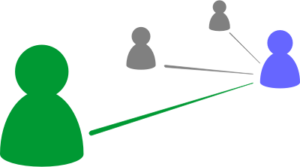Effective research data and software management enhance the reliability and impact of research outcomes, promote transparency, and support the broader scientific community by enabling the reuse and validation of research findings. As head of TU Delft’s research data and software (RDS) team, Dr. Yan Wang oversees all the Library services around research data and software management support for the university. She leads a team that is helping to connect, train, innovate, and support in their goal of enabling researchers to better manage their software and data.
Central coordination
 Research data and software management involve the organised and systematic handling of data and software throughout the research lifecycle. There’s a lot that goes into planning and managing this process, which is crucial for maintaining the integrity, reproducibility, and accessibility of research findings. In June of 2023, when Wang started as Head of Research Data and Software for TU Delft, she brought some valuable experience to the role. Having worked as a data steward and later as coordinator for data stewardship gives her an understanding of what is needed from the researcher’s perspective.
Research data and software management involve the organised and systematic handling of data and software throughout the research lifecycle. There’s a lot that goes into planning and managing this process, which is crucial for maintaining the integrity, reproducibility, and accessibility of research findings. In June of 2023, when Wang started as Head of Research Data and Software for TU Delft, she brought some valuable experience to the role. Having worked as a data steward and later as coordinator for data stewardship gives her an understanding of what is needed from the researcher’s perspective.
The RDS team that Wang oversees is responsible for a number of things. There is the training coordination and development on research data and software management , and the central coordination between the data stewards from each faculty and other university services. In the Digital Competence Centre, a collaboration between the Library and ICT, a group of four data managers from the RDS team work with research software engineers from ICT innovation. They work directly with researchers on their projects and anything related to data management or digital skills. “Now, part of my responsibility is also to contribute to policies and strategies,” says Wang. “I feel like my experience helps me understand what is needed at the operational level, and that helps me to connect with the strategic or tactical approach. I know where to go and how to connect these two sides.”
Diversity of research output
Traditionally, research output has been mainly in the form of published articles. But that is changing and Wang said there is a need to recognise and promote the different types of research output emerging nowadays. “With a lot of data and software involved in research activities, there is an ongoing initiative to diversify the type of research output and also make sure that researchers properly publish their data and software with corresponding recognition,” she said. “Our connection with TU Delft OPEN Publishing is key because they also recognise the importance of the data and software part.” Wang sits on the advisory board of TU Delft OPEN Publishing, where she contributes to shaping policy guidance for journals, reviewing data and software, and raising awareness about the value of publishing these types of output.
OPEN collaborations
The connection with TU Delft OPEN Publishing also created an opportunity for some unique and innovative collaborations. In one project, jointly led by Dr. Frederique Belliard, coordinator of TU Delft OPEN Publishing and publishing advisor Just de Leeuwe, Wang said they wanted to explore and bridge a gap between open data and open access publishing. Although both fields have established practices, there is currently no method to evaluate the impact of open data on open access publishing. “For example, when researchers publish an open access article, we don’t know if they also share their data,” said Wang. “We wanted to find out how well people are doing with this.” The pilot project, which was largely undertaken by two student assistants, resulted in a poster presentation at the 2022 Munin Conference on Scholarly Publishing entitled Connecting open data to open access publishing. They took several sample publications and examined what kind of practices people use when it comes to mentioning, sharing, and citing their data in the publications. The work showed the relevance of the topic and that there is more work to be done to increase both the impact of research findings and the visibility of researchers and research groups.
Another pilot project, led by Saba Sharma from TU Delft OPEN Publishing, focuses on data and software review practices. “It’s an opportunity to innovate and experiment with different ideas of data and software peer review and how we can make data and software reproducible and reusable,” says Sharma. “It has also been a great way to connect with others working in open science who are working along similar themes, to try and pick up some existing best practices.” The project has resulted in a collaboration with a team called CODECHECK on code reproducibility and a workshop at TU Delft which they hope to do on a more regular basis. And there is ongoing work with a data peer review template they developed, discussing ways of doing this review in collaboration with the 4TU.ResearchData repository, and potentially experimenting with more detailed data peer review at one of the Open Publishing journals.
Finding connections

Although research data and software management sounds like just one subject, Wang emphasises that it includes quite a variety of things. “There are so many different teams and people involved,” she says. “Sometimes it’s not easy to see the direct connection, but it’s there. Discovering all these hidden links and getting to know how different teams work is interesting because every team is a different profession.”
Her team works together with many other support services at the university, collecting the best information, expertise, and knowledge that is relevant to research data and software management. That essentially makes her team the connection between research and professional services because they work directly with the researchers. “We also have expertise in the data and software management itself, but in most cases, having the domain knowledge is not sufficient. We need to align with legal, with ethics, with privacy and many others to apply that expertise to concrete research situations,” Wang says. “That’s what our team is doing. We are connecting, transferring, and enabling researchers to manage their data and software better.”
